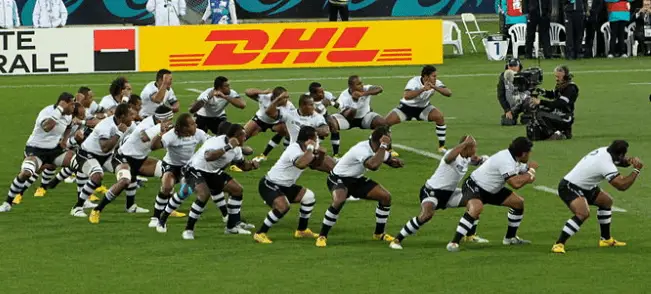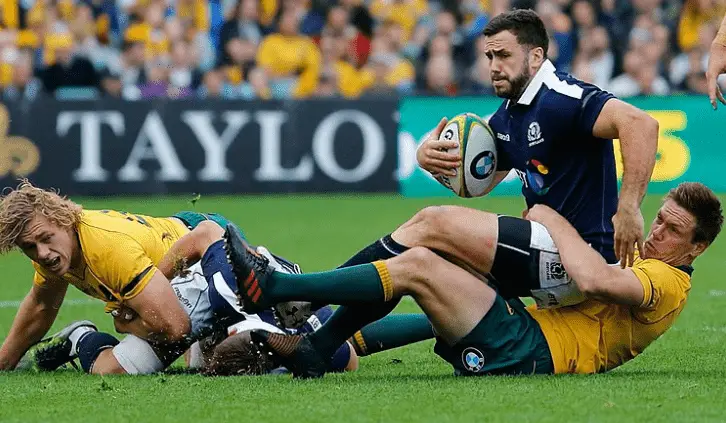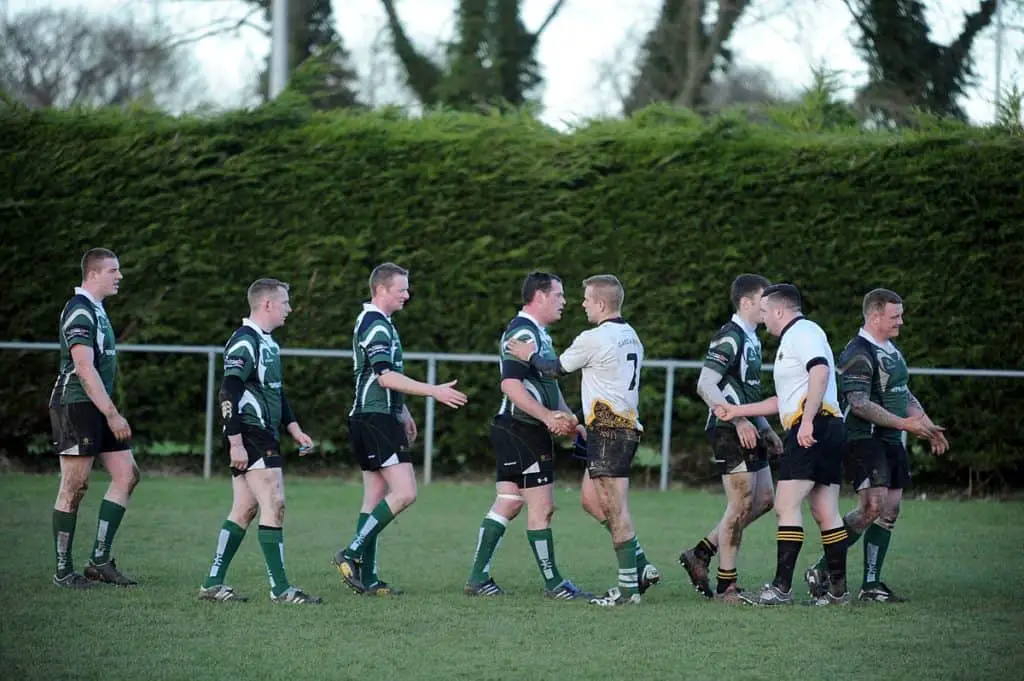Rugby is a widely played sport all across the world, with teams from every walk of life that have different styles, beliefs, and political views. However, one thing they can all agree upon is the way in which rugby should be played.
Rugby culture is built on honor, integrity, respect, discipline, and teamwork. Rugby rules are fair, and all players, coaches, and refs are expected to act professionally and respectfully to everyone on and off the field.
What is the Culture of Rugby Like Today?
From the very beginning, rugby was designed to be a competitive sport that was crucial in a young man’s social and cultural development. It was used to give boys full of testosterone a way to release that pent-up aggression on the field so that they stayed out of trouble off it.
While the rules of the game have changed, and the participants become much more diverse, the authentic culture behind rugby remains the same; to teach life skills such as honor, respect, discipline, and teamwork to all who are involved.
1. Rugby Requires Respect
Whether you are a referee, player, coach, or fan, everyone involved in the sport is expected to give and receive nothing but respect. The rules regarding respect are covered in depth in the World Rugby code of conduct.
A few essential rules and values laid out for all teams by World Rugby include, but are not limited to:
WORLD RUGBY – GOVERNING BODY GUIDLEINES:
- Referees make the calls, and it should not be disputed
- Coaches are in charge of the team and have the authority to make unfavorable decisions
- Fans are required to show the same respect to both teams and act in a mature manner
- Players are only to encourage one another not to swear or speak negatively but instead show class. Source – World Rugby – Spirit of Rugby
Players respecting referees is something that rugby is truly proud of and it has to be the case. Rugby has so many technical laws and infringements that are open to the personal interpretation of the referee that every decision can be argued against.
Of course, this would make for a terrible spectacle and not be much fun to play in, hence, players have to accept the referee’s decisions for the good of the game and everyone knows it.
What the professional players do on a Saturday afternoon on television, will be copied by youngsters on a Sunday morning.
One of the great rugby traditions that you will see after every game is the players forming a tunnel to clap their opponents off the pitch. It happens right from mini junior rugby all the way to the international level and includes the match officials too.

Recommended reading: Why Is Rugby Popular?
2. Rugby Requires Teamwork
Without teamwork, there is no team. No matter how good a single player is, they wouldn’t be successful without the rest. When participating in the sport of rugby union, teamwork is shown through encouragement, assistance, and perseverance from all.
Teamwork is taught just as thoroughly in practice and in games as skills and techniques. Rugby requires different positions to perform different roles in order for other players to shine.
For example, the second row forwards spend hours refining their lineout skills and receive very little praise for this, but, the wingers that score the tries and take most of the glory would not be able to do so without the forwards’ input.
Even in defense, a great deal of teamwork is required in order to ensure that the right-sized players are stood in the correct positions at the correct times. This requires constant communication between the players both speaking and listening.
And, of course, there is nothing better than seeing a good team try. A move that involves all of the team in glorious self-less fashion flowing the length of a pitch to the wonderment of all. Here are a few to savor…
And I couldn’t mention teamwork without sharing this with you. One young lad at a training camp was struggling and this is what his friend said this to him:
“Listen to me. Trust me. Look at me, Bob. I am the shortest kid here, it doesn’t matter if you’re short, if you’re young. It doesn’t matter if you’re tall, or if you are fat here,” he said.
“You are a brilliant rugby player. Do you understand that? You are insane! You are actually insane for your age. Right, give me a hug.”
(Twitter user – source)
What an awesome piece of teamwork from a young lad, that is rugby culture!
Suggested for you: Why Play Rugby (12 Most Important Reasons)
3. Rugby Means Contact
Whether it is a big front-on hit, a scrum, ruck, or maul, rugby means contact. There is no avoiding it, even the fastest nippiest players will eventually run out of room and be clobbered by someone.
It is one of the great attractions of the game, that you can literally go out with a ‘tough guy’ mindset to go and make some ‘big hits’.
Every player knows though, that no matter how big and hard you think you are, someday you will come up against someone bigger and stronger who will put you in your place.
Rugby is a useful outlet for naturally aggressive types to channel their energies which must be preferable to some of the more unsavory options. Additionally, rugby should hopefully teach them how to control their aggression and bring it out at the appropriate moment.
Some people think the aggressive side of the game should be toned down somewhat (read painful truths about rugby here) but I don’t think asking people to hit each other a bit more gently is likely to work.

4. Rugby Requires Discipline
Self-discipline is a significant factor in being a successful rugby player or coach. Keeping your emotions from getting the better of you during an intense match or walking away from an unprofessional opponent may not always be easy. Still, it is necessary to keep the game going and the honorable thing to do.
It is not always easy though, players can, and do lose their tempers, or say the wrong things at times, for which stiff penalties usually follow. Just ask former England captain Dylan Hartley who was guilty of not keeping his discipline during the early to mid part of his career.
Here is his infamous rap sheet and the penalties he received off the back of those.
Self-discipline also applies to how seriously you take the game; making sure you show up to practice on time and being physically and mentally prepared are key to a great game.
5. Rugby Requires Sportsmanship
There is never a reason to brag or boast to the opposing team. Players are expected to stay professional and give respect to everyone no matter which side they play for. Rugby is a game based on being humble.
No matter how intense each match might be, you will frequently see players shake hands at the end of the game, then head out to the bars for a drink or bite to eat. In fact, years later opposition players keep in touch and share words of friendship.

Part of the reason for the sportsmanship among rugby players and fans is due to the fact that the players have left all of their aggression out there on the pitch which means they are in a much calmer frame of mind to befriend opponents afterward.
The fans can also see that the players have given their all physically and again this seems to remove any sense of aggression in the crowd. I have never come across any incidents of rugby crowds fighting or rioting, it’s just not part of rugby culture.
Of course, the media like to kick up a storm as much as possible to sell their precious papers and the game understands that. Head coaches will often dictate the narrative by throwing out controversial or leading statements early in the week before the game which can seem unsportsmanlike.
This is sometimes a tactic employed to undermine or draw attention to a certain area of their opponent’s game that they want the referee to focus on but largely it is also a tactic to keep attention away from individual players and is all part of the game.
There is far less focus on gossip and individual player behavior compared to in premiership football which can be no bad thing. Not that the game is perfect there have been scandals in the past that have gotten out of control but by and large to a much lesser extent.
Recent scandals would include the Israel Folau situation, Lawrence Dallaglio’s sting and Rassie Erasmus’ infamous very unsporting video.
6. Rugby Culture and Drinking
I couldn’t really talk about rugby culture without mentioning beer. Sharing a few beers with your teammates win lose or draw is part of the ritual and the drinking games and singing that follows all play an important role in the camaraderie that a rugby club house can build.
And a special mention should go out to the tradition named ‘buffalo’ the origins of which have been lost in the midst of time but essentially it is a universal rugby rule that everybody is required to drink using their non-dominant hand, i.e. their left hand.
Anyone caught drinking with their ‘wrong’ hand is required to finish their drink after someone has spotted them and given a clear buffalo shout in that person’s direction, much to the amusement of all who enjoy the ensuing embarrassment of the offender for making such a rookie error.
There is a line, however, as regards alcohol and it is fair to say rugby has crossed it a few times as regards alcohol and it is something that needs reigning in.
In a recent Six Nations match, a poor child was left covered in the vomit of an inebriated fan as early as the first half of the game. Let’s keep the beer for the bar afterward shall we gents?
Suggested reading: The 31 Skills Needed To Play Rugby
7. Rugby culture means touring
You are not a rugby player until you have been on a rugby tour as a player. Sharing new experiences with your teammates over the course of a few days or longer builds lasting memories and brings the team closer.
Yes, a fair amount of alcohol is likely to be consumed, reputations will be won and lost through the nonsensical activities that will catch up with tourists, young and old, but fun will be had, beer will be drunk and rugby will be the winner.
First-time tourists will be ‘tour virgins’ and will usually be treated with disdain throughout, often being employed as ‘beer bitches’ serving drinks to the rest of the lads.
Drinking games and songs will again be prominent but the element of respect will remain:
After tour matches, each captain will say a few words and present the opposition captain with some form of memorabilia to remember them by, perhaps an engraved shield, or club tie.
Just remember, what goes on tour stays on tour! Most of the time that is, here’s James Haskell and co-spilling a few beans in a cracking episode of Good, Bad, Rugby podcast.
8. Rugby culture is alpha
Some might disagree but when a large part of a game revolves around how hard you can hit an opponent and how much pain you can endure then it is going to attract alpha males.
Of course, there are opportunities for all shapes and sizes of personalities and attitudes in rugby but a core pillar of a successful team is likely to be a group of alpha males (unless it’s a women’s game obviously).
In fact, to achieve at the highest level I would say it would be impossible to do so without being alpha, testosterone-fueled, and full of aggression – all channeled in the right way of course.
Elements of the media frown upon this aspect of the game and say society has moved on from celebrating masculinity. Everyone is entitled to their point of view… but really?
What are we supposed to do? Turn away the alpha males? Tell them to not hit each other so hard because some poor dear might be offended by the maleness of it all? Grow up, will you!
Live and let live I say, if you are not mad keen on rugby culture then by all means don’t get involved, it might not be for you. However. If you like the sound of some aspects of rugby culture then get down to your local club and get involved!
What is the Culture of Rugby Like in New Zealand?
In New Zealand, Rugby is more than just a game; it is a way of life for so many residents, whether that’s how a father and son bond for a few evening hours or how friends find time to get together on Friday nights. Rugby has found a way into most New Zealander’s lives and has become the identity of the country for nearly 150 years.
The famous ‘Haka’ performed by the All Blacks before every game shows how deeply entrenched culture and tradition are embedded in the game there.
Even the school boys perform it as though their life depends on it, check this haka out from a high school – unbelievable.
Incidentally, the All Blacks famously have a ‘no dick heads’ policy which is a very frank way of ensuring that no egos develop and everyone stays true to the humbleness that the game requires and preaches.
While cultural diversity once stood in the way of making this game only accessible to certain people, the strides and changes made over time credit rugby with bringing people together and keeping the honor and respect part of the game.
Recommended for you: 14 Rugby History Facts Everyone Should Know
What is the Culture of Rugby Like in South Africa?
Like New Zealand, Rugby is one of the most popular sports in the country, only falling second to soccer. It is a reputable and professional sport that believes in fair and just games with ethical attitudes and humble endings.
Rugby culture in South Africa revolves around the physicality of their tackling and the powerfulness of their scrummaging. They are the most direct and powerful sportspeople on the planet, and this physical edge they enjoy over opponents seems to pass from one generation to the next.
It is not enough to be as strong as the South Africans (also known as Springboks), or as big as the Springboks. You have got to want it as much as they do. This is what really sets them apart.
Any player can build up their size and strength but they cannot build up their passion for playing for their country. For South Africans, rugby appears to be much more than a sport. A vehicle to show their passion and desire to the world perhaps.
While they currently have one of the best, if not the best, Rugby Union team, it seems South Africa has taken a somewhat slower approach to end political and racial influence over the sport.
However, with inspiration set forth by Nelson Mandela, nearly 30 years ago, rugby is heading in the right direction.
Both countries have high respect for the sport. You will see schools, universities, and parks with two-goal posts set up everywhere you go; kids will be outside passing the balls with their friends and family, and televisions in many households will be tuning in on game day.
What is rugby culture in England like?
Historically, the rugby culture in England has been associated with wealthier private school types. This has not been helpful for the spreading of the game as people from more working class backgrounds have commented on feeling as though they do not fit in.
However, visit any rugby club across England on a Saturday afternoon for senior matches or Sunday morning for mini junior matches and I can guarantee you will receive a warm welcome.
English rugby clubs are the second homes of many players and members of the community and normally pride themselves and their diversity and the fact that the game itself is for all shapes, sizes, colors, creeds, and genders.
You can see that this is the case by how widely the women’s game has come in the last ten years. Yes, there have been barriers but women’s rugby continues to grow and be welcomed alongside the men’s game, and long may this be so.
The best way to decide whether you enjoy the rugby culture or not is to get down to your local club at the weekend and see what is going on. You might be pleasantly surprised by how welcome you are made to feel. So, why not get involved!
You might like this: The Uniqueness of Rugby: 7 Key Points
Image credits
Australia Tackle www.davidmolloyphotography.com from Sydney, Australia, CC BY 2.0, via Wikimedia Commons.
Fijian Haka Craig Boyd, CC BY-SA 2.0, via Wikimedia Commons
Irish Defence Forces from Ireland, CC BY 2.0, via Wikimedia Commons
Auckland Rugby Union cap; belonged to Freddie W Lucas, Auckland rep and member of 1924 Invincibles All Blacks rugby team Auckland Museum, CC BY 4.0, via Wikimedia Commons
